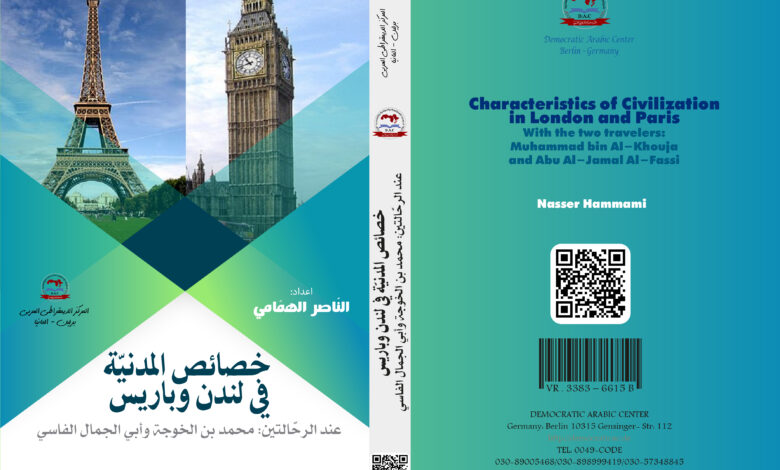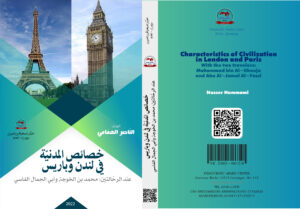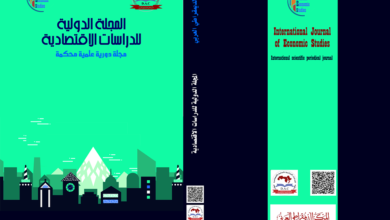خصائص المدنيّة في لندن وباريس عند الرحّالتين: محمد بن الخوجة وأبي الجمال الفاسي
Characteristics of Civilization in London and Paris With the two travelers: Muhammad bin Al-Khouja and Abu Al-Jamal Al-Fassi

تأليف : النّاصر الهمّامي
نسخة “pdf”-
خصائص المدنيّة في لندن وباريس عند الرحّالتين محمد بن الخوجة وأبي الجمال الفاسي
الطبعة الأولى “2022″ –من كتاب: –
خصائص المدنيّة في لندن وباريس عند الرحّالتين محمد بن الخوجة وأبي الجمال الفاسي
جميع حقوق الطبع محفوظة #المركز_الديمقراطي_العربي ولا يسمح بإعادة إصدار هذا الكتاب أو اي جزء منه أو تخزينه في نطاق إستعادة المعلومات أو نقله بأي شكل من الأشكال، دون إذن مسبق خطي من الناشر .
تقديم :
لقد ارتأينا في هذا الكتاب البحث في خصائص المدنيّة في لندن وباريس في النّصف الثّاني من القرن التّاسع عشر من خلال دراسة كتابين هامّين لرحّالتين مغاربيّين، وهما: الرحّالة التّونسي محمّد بن الخوجة الذي قام برحلة إلى باريس ودوّنها في كتابه: سلوك الإبريز في مسالك باريز، والرحّالة المغربي أبو الجمال الفاسي الذي قام برحلة إلى لندن وكتب عنها كتابه: الرّحلة الإبريزيّة إلى الدّيار الأنجليزيّة. وقد تزامنت هذه الرّحلات مع بداية التّحدّيات الاستعماريّة (الفرنسيّة والإسبانيّة والبريطانيّة) التي واجهتها منطقة المغرب العربي الكبير. فكانت شاهدة على طبيعة العلاقة المتأزّمة والقلقة بين الأنا والآخر. وقد سلكنا في هذا البحث منهجا تحليليّا مقارنيّا متدرّجا من العام إلى الخاصّ، فقد قسّمنا الكتاب إلى أربعة فصول، افتتحناه بفصل تمهيديّ أوّل، خصّصناه لتقديم مفهوم مفصّل للمدنيّة ولإبراز أهمّية الرّحلة والرحّالة في التّراث العربي الإسلامي قديما وحديثا، في تجسيد قيم التّواصل الحضاري والتّلاقح الثّقافي بين الأمم والشّعوب. ثمّ بينّا في الفصل الثّاني خصائص المدنيّة الباريزيّة في نظر الرحّالة التّونسي محمّد بن الخوجة، أمّا في الفصل الثّالث فقد ركّزنا على إبراز خصائص المدنيّة اللّندنية في نظر الرحّالة المغربي أبو الجمال الفاسي. وقد ختمنا الكتاب بفصل رابع حدّدنا فيه نقاط الائتلاف والاختلاف ومواطن الطّرافة أو التطرّف في هاتين الرّحلتين.
وقد استنتجنا من خلال ذلك تميّز كلّ من باريس التي هي رمز للمدنيّة الفرنكفونية ولندن التي هي رمز للمدنيّة الأنجلوفونيّة بخصائص وسمات جعلتهما تتبوّءان مركز الصّدارة الحضارية العالمية في النّصف الثّاني من القرن التّاسع عشر. ويمكن تلخيصها في تثمين العلم والمعرفة وتشجيع الاختراع والابتكار التّقني، وكذلك الاهتمام بتحديث الصّناعة وتعصير الفلاحة عن طريق استعمال الآلات والتّقنيات الجديدة. وتقديس العمل وحسن استثمار الوقت وتنظيمه، والحرص على إتقان العمل والتّخطيط المستقبليّ، مع حبّ الوطن واحترام لقواعد العيش المشترك.
كما استنتجنا وجود مدرستين فكريّتين إصلاحيّتين مختلفتين في المجال المغاربيّ: مدرسة مغربيّة مخزنيّة محافظة منكفئة على ذاتها، لم تقدر في تلك المرحلة التّاريخيّة المتأزّمة على فهم المقوّمات الحقيقيّة للمدنيّة والحداثة، وذلك بسبب التّهديدات الاستعمارية التي كانت تعيشها المغرب حينئذ، فاقتصرت على اعتبار تحديث الجيش واكتساب القوّة العسكريّة هو السّبيل الوحيد لتحقيق التطوّر الحضاري. بينما وجدنا في المقابل مدرسة تونسيّة مؤمنة بحتميّة التّواصل والتّفاعل مع الآخر، ومتشبّعة في الآن ذاته بمصادر هويّتها بفضل ارتكازها على إرث حضاري تونسي إصلاحي عريق، يعتبر أنّ الرّهان على التّعليم والإصلاح الاجتماعي والاقتصاديّ، هو السّبيل الأوحد لاكتساب مقوّمات المدنيّة والحداثة.
Prepare : Nasser Hammami
Abstract
In this book, we decided to research the characteristics of civilization in London and Paris in the second half of the nineteenth century by studying two important books of Maghreb travelers, namely: the Tunisian traveler Muhammad Ibn Al-Khouja, who made a trip to Paris and wrote it down in his book: The Behavior of the Briz in the Baris Routes, and The Traveler. Moroccan Abu al-Jamal al-Fassi, who made a trip to London and wrote about it his book: Abrizi’s Journey to English Homeland. These trips coincided with the beginning of the colonial challenges (French, Spanish and British) faced by the Maghreb region. She was a witness to the nature of the tense and anxious relationship between the ego and the other. In this research, we have taken a gradual comparative analytical approach from the general to the specific. We divided the book into four chapters, which we opened with a first introductory chapter. We devoted it to presenting a detailed concept of civilization and to highlighting the importance of the journey and the pilgrim in the Arab Islamic heritage, ancient and modern, between the values of cultural communication and intercultural communication in the field Nations and peoples. Then, in the second chapter, we explained the characteristics of Parisian civilization in the view of the Tunisian traveler Muhammad ibn Al-Khoja. As for the third chapter, we focused on highlighting the characteristics of the London civilization in the view of the Moroccan traveler Abu Al-Jamal Al-Fassi. We concluded the book with a fourth chapter in which we identified the points of convergence and difference and the areas of wit or extremism in these two journeys.
From this, we concluded that Paris, which is a symbol of Francophone civilization, and London, which is a symbol of Anglophone civilization, were distinguished by the characteristics and characteristics that made them occupy the center of global civilization in the second half of the nineteenth century. It can be summed up in valuing science and knowledge, encouraging invention and technical innovation, as well as paying attention to modernizing industry and modernizing agriculture through the use of new machines and technologies. The sanctification of work, good investment and organization of time, keenness on mastering work and future planning, with love for the homeland and respect for the rules of coexistence. We also concluded that there are two different reformist schools of thought in the Maghreb: a conservative Moroccan school of Makhzan, which is incompatible with itself, which, in that critical historical stage, was unable to understand the true components of civilization and modernity, due to the colonial threats that Morocco was experiencing at the time, so it was limited to considering the modernization of the army and not Military is the only way to achieve civilized development. On the other hand, we found a Tunisian school that believes in the inevitability of communication and interaction with the other, and is at the same time saturated with the sources of its identity thanks to its reliance on a long-standing reformist Tunisian civilizational heritage. It considers that betting on education and social and economic reform is the only way to acquire the elements of civility and modernity.
- الناشر: المركز الديمقراطي العربي للدراسات الإستراتيجية والسياسية والاقتصادية





